This article has been reviewed according to Science X's editorial process and policies. Editors have highlighted the following attributes while ensuring the content's credibility:
fact-checked
reputable news agency
proofread
Video provides first clear views of WWII aircraft carriers lost in the pivotal Battle of Midway
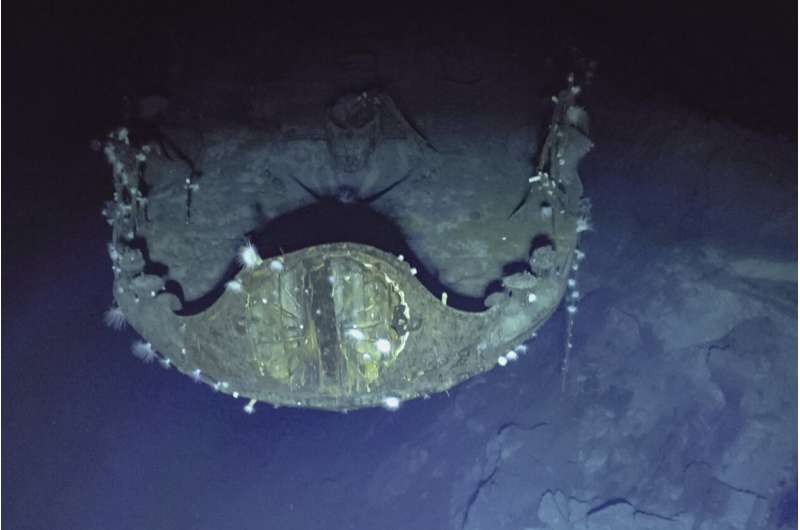
Footage from deep in the Pacific Ocean has given the first detailed look at three World War II aircraft carriers that sank in the pivotal Battle of Midway and could help solve mysteries about the days-long barrage that marked a shift in control of the Pacific theater from Japanese to U.S. forces.
Remote submersibles operating 3 miles (4.8 kilometers) below the surface conducted extensive archeological surveys in September of the Akagi and the Kaga, two of the four Imperial Japanese Navy aircraft carriers destroyed during the June 1942 battle, as well as the U.S.S. Yorktown.
The high-quality video includes the official identification of the Akagi, while also providing new clues about the final hours of the aircraft carriers.
The footage shows how the island, or the tall structure that rose above the Yorktown's wooden deck, was damaged by extremely high heat and how the crew went to great lengths to keep the American ship from sinking.
Julian Hodges, one of the last living veterans who served on the Yorktown, and who swam six hours with a dislocated shoulder to a rescue ship, teared up as he watched.
"Boy, she took a beating," Hodges said, just weeks shy of his 101st birthday. "I just hated to see my ship torn up like that."
All three aircraft carriers were found previously, the Yorktown in 1998 and the Japanese ships four years ago. The Akagi was only preliminarily identified, however, and limited images were recorded of the other two.
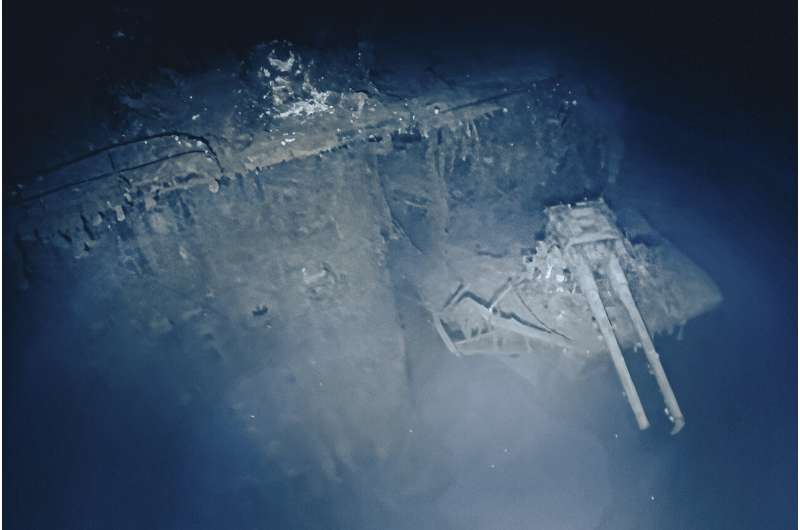
That changed when Ocean Exploration Trust—founded by Bob Ballard, who led teams that discovered the Yorktown and the Titanic—conducted extensive video surveys of the three ships during a month-long exploration of the Papahānaumokuākea Marine National Monument in the Northwestern Hawaiian Islands, about 1,300 miles (2,092 kilometers) northwest of Honolulu.
"We were able to spend over basically three full days on these sites, including two full days on the seafloor, really methodically and thoroughly documenting the entire wrecks," Daniel Wagner, the chief scientist for Ocean Exploration Trust, told The Associated Press via videoconference from the exploration vessel Nautilus.
The surveys were streamed online, allowing more than 100 scientists, historians and other experts from across the world to participate in a live forum alongside about two dozen scientists aboard the Nautilus.
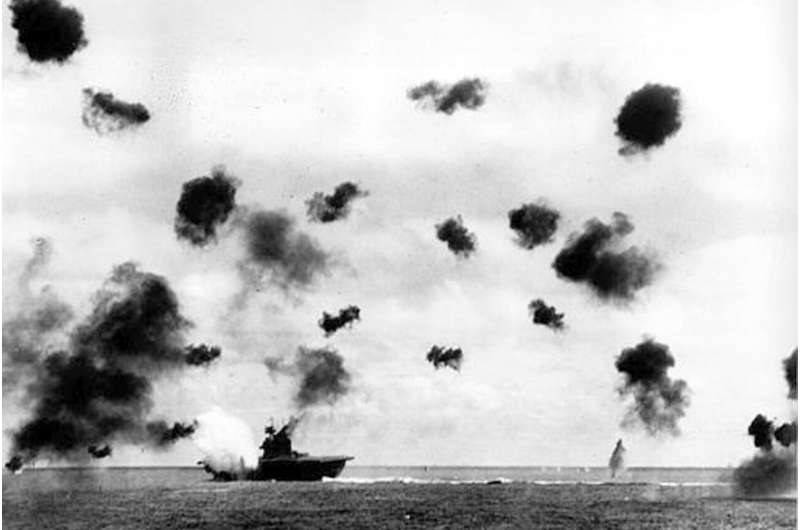
The Battle of Midway took place six months after the Japanese attacked Pearl Harbor on Dec. 7, 1941. The Japanese navy aimed to take control of the U.S. patrol plane base in a surprise attack at Midway Atoll, a tiny group of islands roughly halfway between the U.S. mainland and Asia. The country also wanted to destroy what was left of the U.S. Pacific Fleet.
But U.S. forces intercepted communications about the attack and were ready.
The five-day battle was fought about 200 miles (322 kilometers) off the group of islands. Besides sinking the Akagi, the Kaga and two other Japanese aircraft carriers, U.S. forces shot down more than 250 Japanese airplanes. More than 3,000 Japanese servicemen died.
U.S. losses included more than 300 servicemen, about 150 airplanes and the Yorktown, which was damaged in the battle and then sunk by a Japanese submarine about 100 miles (161 kilometers) away while being towed for repairs.
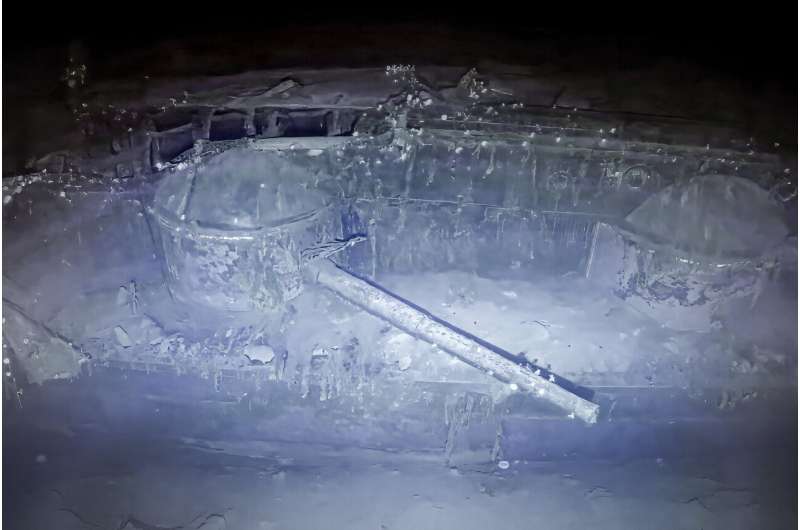
Of the 4,600 or so men who served on the Yorktown from 1937 to 1942, it's believed there are only two still alive, said Michael Leggins, president of the U.S.S. Yorktown CV-5 Club, a group dedicated to providing information about the ship.
One of them, Hodges, is a retired Baptist minister in Johnson City, Tennessee. He joined the Navy the day after Pearl Harbor and worked in the Yorktown's boiler room during the battle.
He recalled in a videoconference interview with the AP that after two torpedoes exploded, he found himself stuck between two pipes, his left arm so tightly pinned he couldn't pull it out. His shoulder was also dislocated, an injury that still troubles him 81 years later.
Once freed with the help of a fellow sailor, a life jacket was taped over his injured shoulder and he held on to another to swim more than 3 miles (4.8 kilometers) to a waiting ship. He said the journey took about six hours.
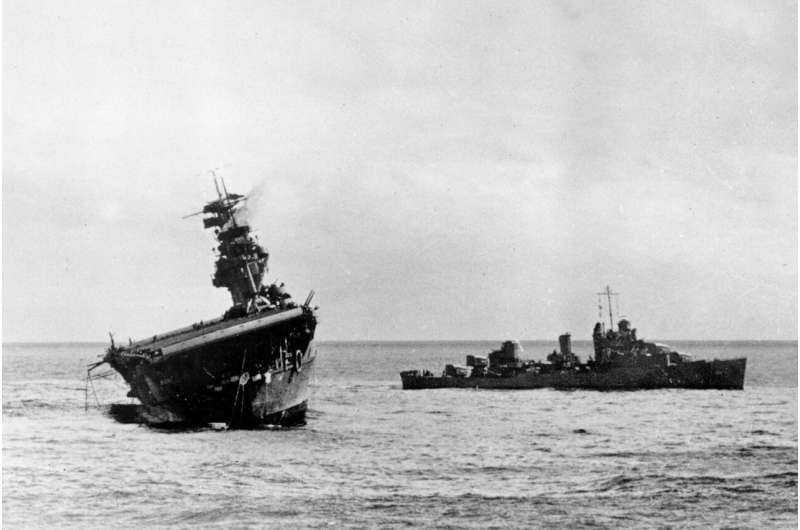
The other surviving Yorktown veteran, Robert Taylor, needed parental permission to join the Navy on Sept. 12, 1941, at the age of 17. Taylor, now 99, manned an anti-aircraft gun during the battle.
Historians knew the crew tried to keep the ship afloat by jettisoning some smaller anti-aircraft guns on the port side. But among the discoveries from the new video was that the sailors also cut away the larger guns, said Hans Van Tilburg, the maritime archeologist and historian for the National Oceanic and Atmospheric Administration's Office of National Marine Sanctuaries.
The action "speaks to the dedication of the crew to save their vessel in the last and final moments of that ship's service," he said.
When ordered to abandon ship, Taylor jumped overboard and tried to swim to a nearby destroyer, U.S.S. Balch, giving his life jacket to a fellow sailor who didn't know how to swim.
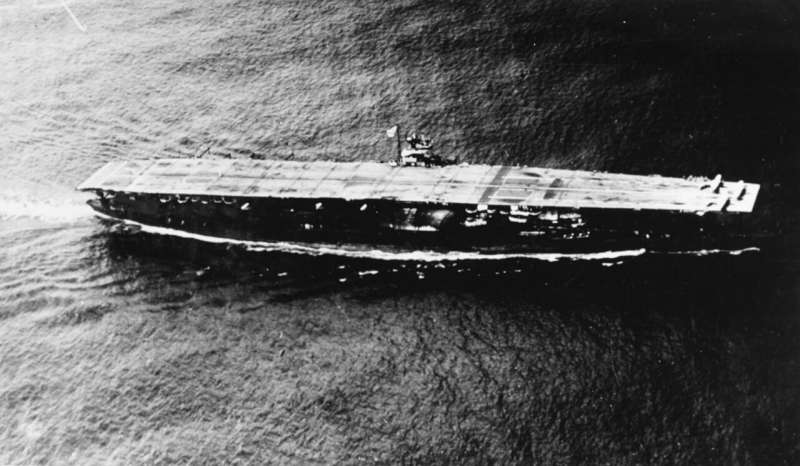
But as he neared the Balch, the ship started moving off to pick up more men in the water. A crewman on board tossed a line, which Taylor said he grabbed with his foot. He got alongside the destroyer and was pulled aboard but doesn't remember much afterward.
"They tell me I was screaming," he told the AP from his home in Auburndale, Florida. The ordeal left him with post-traumatic stress disorder.
The carriers will remain in their current location in U.S. protected waters, which should prevent them from being looted or becoming tourist destinations like the Titanic.
The only things to be taken from the wrecks, Wagner said, will be the images and video they are sharing.
Hodges said he appreciated that. "Nobody's going to get anything out of it," he said.
He hopes the video spurs a new generation to consider the toll of conflict: "Whatever it takes to put wars out of business."
-
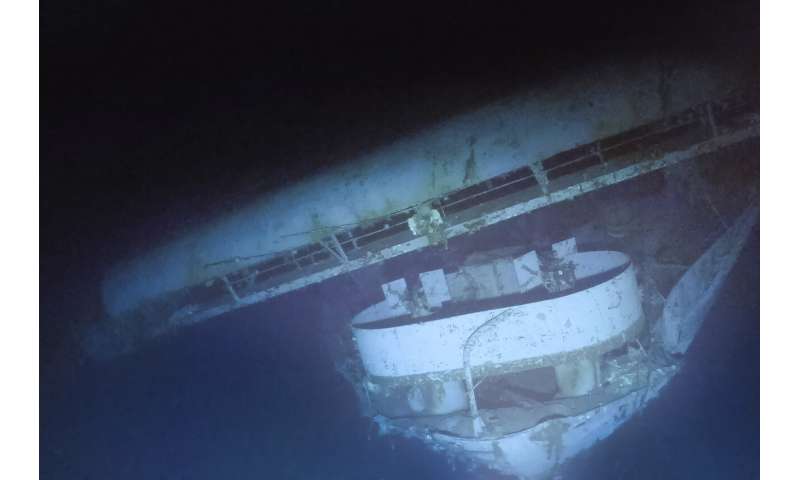
In this photo provided by the Ocean Exploration Trust, the starboard list of the aircraft carrier USS Yorktown on the seafloor can be seen in the flight deck, also collapsing towards the starboard side at the bow with an anti-aircraft gun tub below on Sept. 10, 2023. Footage from remote submersibles taken three miles under the Pacific Ocean is giving the world the first detailed glimpse of three World War II aircraft carriers that sunk in the pivotal Battle of Midway, which marked a shift in control of the Pacific naval theater from Japanese to U.S. forces.Credit: Ocean Exploration Trust/NOAA via AP -
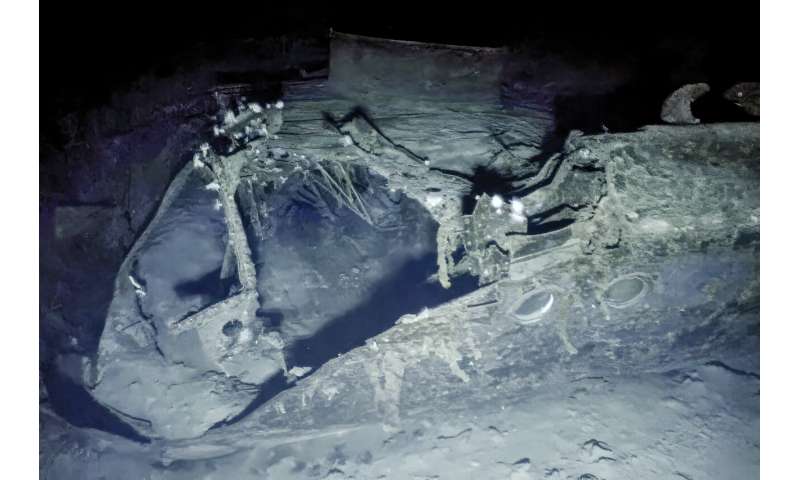
In this photo provided by the Ocean Exploration Trust, is the broken stern of the Japanese aircraft carrier Kaga with a view inside from the starboard quarter on Sept. 10, 2023. Footage from remote submersibles taken three miles under the Pacific Ocean is giving the world the first detailed glimpse of three World War II aircraft carriers that sunk in the pivotal Battle of Midway, which marked a shift in control of the Pacific naval theater from Japanese to U.S. forces. Credit: Ocean Exploration Trust/NOAA via AP -
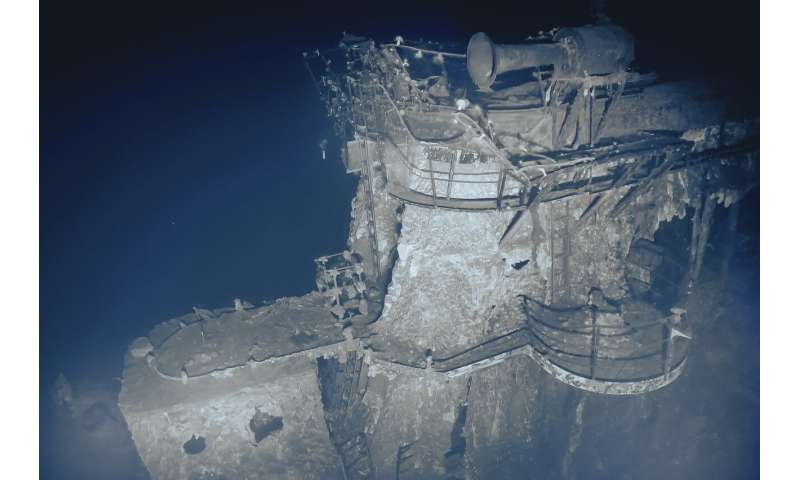
In this photo provided by the Ocean Exploration Trust, standing tall above the leaning flight deck, the shipʻs island is the most prominent feature on the USS Yorktown aircraft carrier on Sept. 10, 2023. Footage from remote submersibles taken three miles under the Pacific Ocean is giving the world the first detailed glimpse of three World War II aircraft carriers that sunk in the pivotal Battle of Midway, which marked a shift in control of the Pacific naval theater from Japanese to U.S. forces. Credit: Ocean Exploration Trust/NOAA via AP -
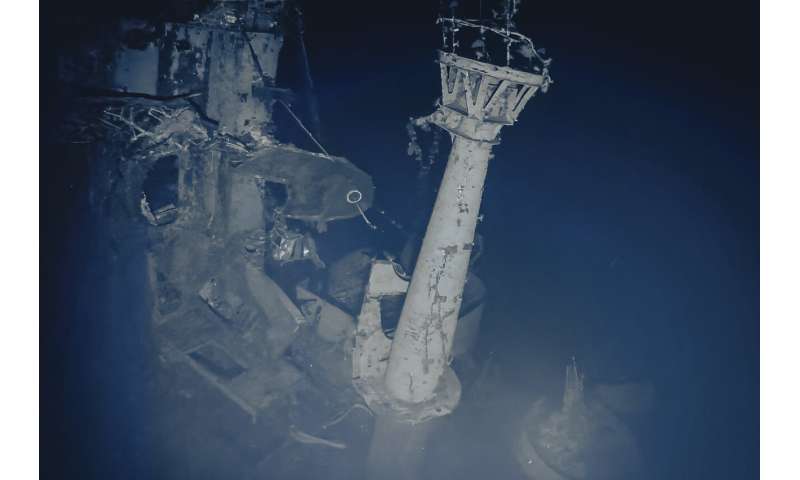
In this photo provided by the Ocean Exploration Trust, the aircraft crane of the carrier USS Yorktown still stands at the aft end of the ship's island on Sept. 10, 2023. Footage from remote submersibles taken three miles under the Pacific Ocean is giving the world the first detailed glimpse of three World War II aircraft carriers that sunk in the pivotal Battle of Midway, which marked a shift in control of the Pacific naval theater from Japanese to U.S. forces. Credit: Ocean Exploration Trust/NOAA via AP -
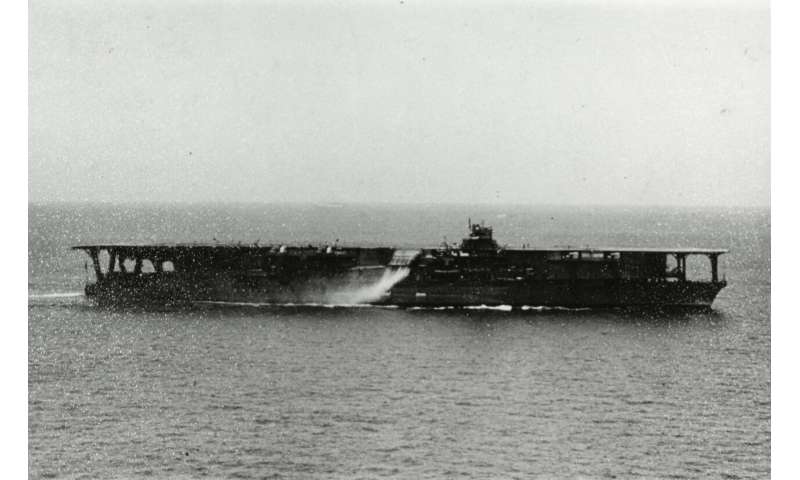
In this photo provided by the Naval History and Heritage Command is the Japanese aircraft carrier Kaga at sea in the 1930s. Footage from remote submersibles taken three miles under the Pacific Ocean is giving the world the first detailed glimpse of three World War II aircraft carriers that sunk in the pivotal Battle of Midway, which marked a shift in control of the Pacific naval theater from Japanese to U.S. forces. Credit: Naval History and Heritage Command via AP -
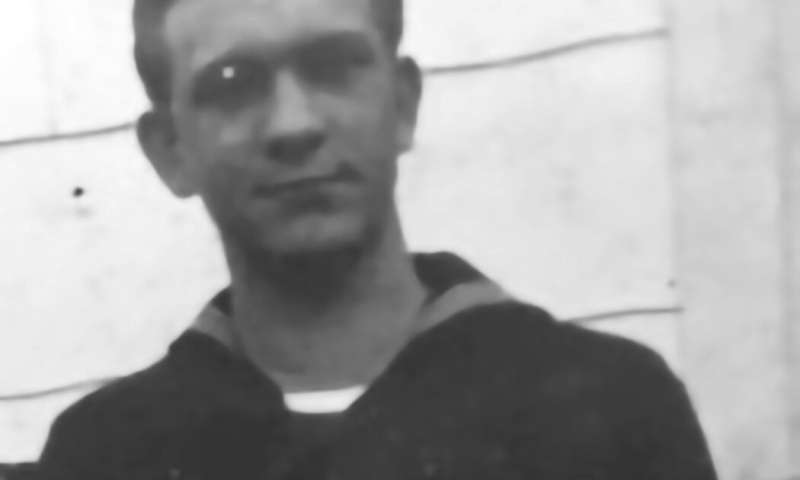
This 1944 photo provided by Debbie Hodges shows Julian Hodges in his Navy uniform in Lewiston, Mont. Julian Hodges, now of Johnson City, Tenn., is believed to be one of the last two men alive of the 4,600 servicemen who between 1937 and 1942 served aboard the USS Yorktown, an aircraft carrier sunk by a Japanese submarine following the June 1942 Battle of Midway. Credit: Courtesy of Debbie Hodges via AP -
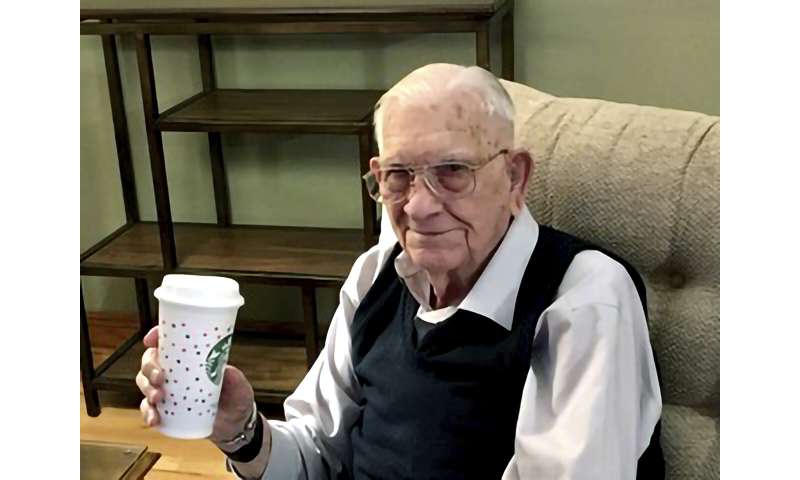
This photo provided by Debbie Hodges shows Julian Hodges at his home in Johnson City, Tenn., Dec. 25, 2021. Hodges is believed to be one of the last two men alive of the 4,600 servicemen who between 1937 and 1942 served aboard the USS Yorktown, an aircraft carrier sunk by a Japanese submarine following the June 1942 Battle of Midway. Credit: Courtesy of Debbie Hodges via AP -
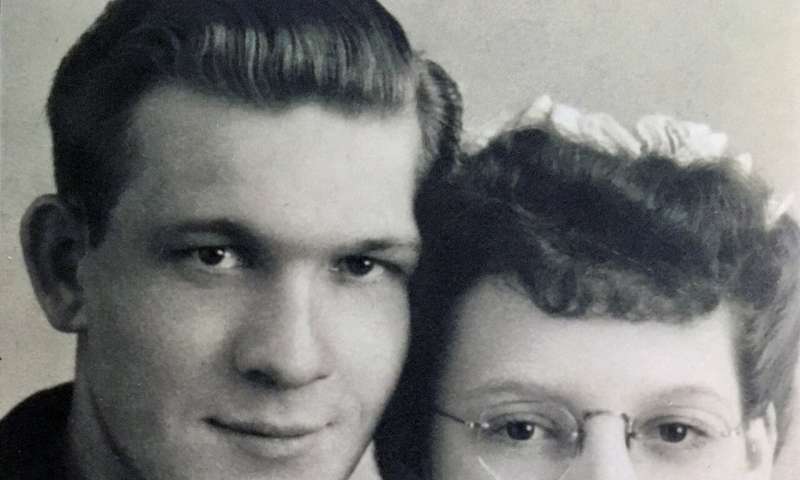
This Jan. 21, 1944, photo, provided by Debbie Hodges shows Julian and Jacqueline Hodges on their wedding day in Lewiston, Mont. Julian Hodges, now of Johnson City, Tenn., is believed to be one of the last two men alive of the 4,600 servicemen who between 1937 and 1942 served aboard the USS Yorktown, an aircraft carrier sunk by a Japanese submarine following the June 1942 Battle of Midway. Credit: Courtesy of Debbie Hodges via AP -
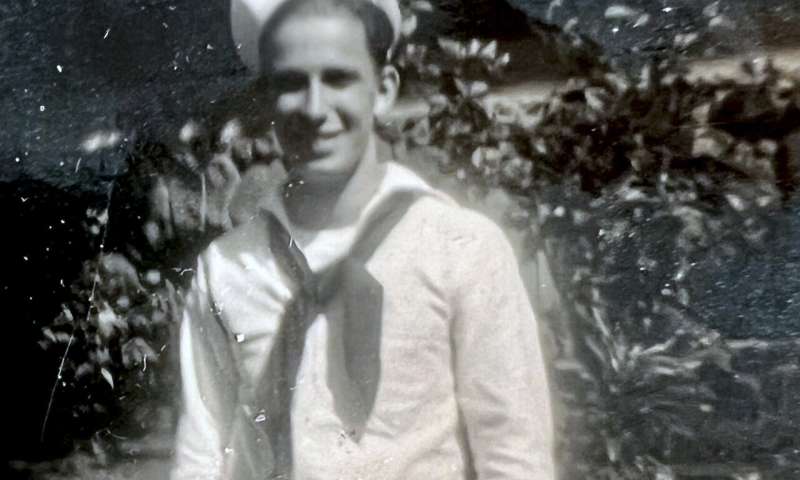
This undated photo provided by Mark Taylor shows Robert Taylor in his Navy uniform. Robert Taylor, of Auburndale, Fla., is believed to be one of the last two men alive of the 4,600 servicemen who between 1937 and 1942 served aboard the USS Yorktown, an aircraft carrier sunk by a Japanese submarine following the June 1942 Battle of Midway. Credit: Courtesy of Mark Taylor via AP -
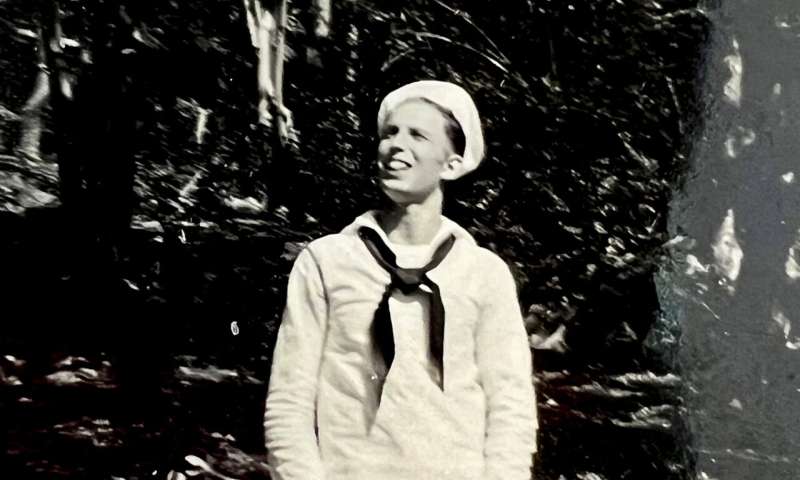
This undated photo provided by Mark Taylor shows Robert Taylor in his Navy uniform. Robert Taylor, of Auburndale, Fla., is believed to be one of the last two men alive of the 4,600 servicemen who between 1937 and 1942 served aboard the USS Yorktown, an aircraft carrier sunk by a Japanese submarine following the June 1942 Battle of Midway. Credit: Courtesy of Mark Taylor via AP -
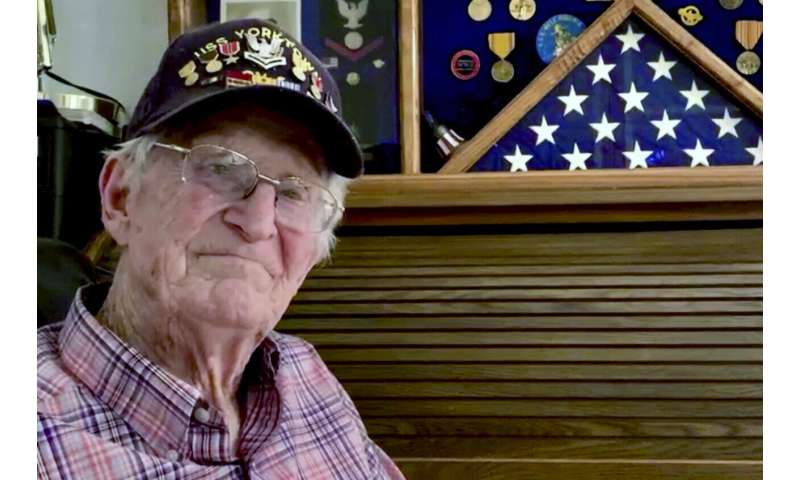
This undated photo provided by Mark Taylor shows Robert Taylor at his home in Auburndale, Fla. Robert Taylor is believed to be one of the last two men alive of the 4,600 servicemen who between 1937 and 1942 served aboard the USS Yorktown, an aircraft carrier sunk by a Japanese submarine following the June 1942 Battle of Midway. Credit: Mark Taylor via AP
Taylor quipped that he would like the ship raised, if only to retrieve the $28 he left in his locker when the ship went down, about $530 in today's money.
Joking aside, the destruction of the Yorktown haunts him. "I was really upset because I loved that ship," Taylor said. "It took a lot to sink it."
© 2023 The Associated Press. All rights reserved. This material may not be published, broadcast, rewritten or redistributed without permission.




















